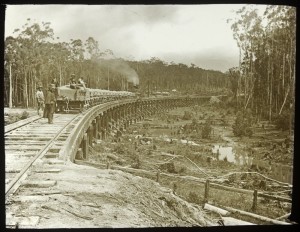Peramble(ate)
I am writing the screenplay of the radio play Under the Forest. My plan (until life intervenes) is to write the script and blog the process. Both enterprises will appear here in regular/semi-regular/when-and-as-I-can instalments. Below is a tentative opening scene. I am yet to work out the best way to post script in html, so I apologise for the poor formatting – posting pdfs for single scenes is doable but a bit clunky for readers.
The Process Cart
This is how to write a screenplay: Plan, Research, Plot, Write the Words. This is an unfailingly correct way to work, much like the paradigm of academic process, and most other enterprises. I teach this and believe it up to a point. That is, do it until you know your own method/failings/soul. I discovered mine when I was doing my PhuD. I was and remain crap at research as research. That is, I can only research and plan while I write. My way of justification is that writing itself is research and writing itself is planning and plotting. In my PhuD process, writing led to places from which I found gifts to bring back to the writing. I walked the bridge in the picture above after I had written it in to my play. At that point I went into a panic, because the bridge was not where I thought it was. It didn’t matter of course, given I was writing a play set in an unnamed place, but it did matter that I thought I had stuffed up the research process. I eventually found that the really interesting stuff in the subsequent drafts of the play happened in the new space established by the research process.
And the Before Horse
For this screenplay, I have the research. I have a template of a different form against which I test my new material. I am doing what I do, which is to throw the sequential stages into the pot together and cook it up as is. So I am writing a timeline as I write scenes. Below might stay or go. The impetus here is to begin to contextualise the characters and to establish the point of view of John, the first protagonist. I want to establish his position at the edge of the forest, where he remains (with his sister, the second (equal) protagonist). And I also want to establish the very intense patriarchal culture and underlying violence of the story. The very next scene takes a tentative step into the forest, before we plunge in deep around 3-4 minutes in. Anyway, here’s the first scene…
EXT.FOREST EDGE CAMP – DAY
At the edge of the forest in a dusty camp occupied by maybe twenty to thirty males, men and boys. The rainforest towers over the camp.
There is a disturbance at the centre of the camp. All are gathered in a circle around two wrestling bodies.
The combatants are Caleb, aged 15 and his father, Joseph. The fight is somewhere between a formal wrestling bout and angry violence. Joseph works hard to maintain a cool exterior, but Caleb is full of rage.
The watchers are cheering, but with a sense of discomfort, as though the scene they are watching is disquieting. We focus on one of the watchers, a boy of 13. This is John, brother of Caleb. John is becoming more and more worried as the battle continues. He is not sure what to do, but he wants the fighting to stop.
Joseph gets Caleb down.
JOSEPH
(forced laugh) I reckon I got you, son.
Caleb squirms
JOSEPH
(continuing) Give it up, son.
Caleb spits on him. Joseph loses the calm veneer, slaps Caleb hard across the face.
JOSEPH
(continuing) Enough. (gets up) Fun’s over. Why don’t you all fuck off?!
The crowd begin to disperse. Joseph starts to walk away, but suddenly Caleb is on him. He shoves Joseph to the ground and starts pounding into him.
JOHN
Caleb!
John drags Caleb off.
CALEB
Piss off.
He shoves John to the ground.
Joseph is quickly to his feet. He punches Caleb hard. Caleb manages to stay on his feet, but is otherwise helpless. Joseph hits him another two or three times, hard. Caleb hits the deck. Joseph stands over him.
JOSEPH
Now, stop it!
Caleb can see the funny side, despite the blood and pain.
CALEB
Yeah, good idea, Dad. Busy day tomorrow.
Joseph doesn’t know how to react. He ends up walking away.
John picks Caleb up, drags him to a water trough
JOHN
Why do you do that?
Caleb has his eye on the forest.
CALEB
It’s calling to us. You hear?
JOHN
What? What is?
Caleb laughs, but says nothing.


